Call
June 12: Why we reject call for protest in Gombe- Groups

By Our Correspondent
A coalition of youth groups in Gombe State, on Wednesday condemned the recent killing of a 45-year-old community leader and industrialist, Amadu Kasiran, on June 8 by some suspected Kalare boys, describing the act as a threat to peace in the state.
Speaking through a joint press statement issued in Gombe, Mr MK Ishaku, the publicity secretary for the coalition urged the security agencies to leave no stone unturned towards ensuring that the suspects were brought to book.
The groups which focus on peace-building, good governance and youth development comprised Youths with Vision and Progressive Youths for Gombe.
Ishaku said that the life of every citizen in the state is important and must be protected in line with the provisions of the constitution of the Federal Republic of Nigeria.
He called on the security agencies to put in more efforts to stem the tide of criminality and other issues that were threatening the peace of residents of the state.
He said that the prevailing peaceful coexistence being enjoyed in the state needed the collective efforts of all residents to be sustained, hence urged residents to also support security agencies in addressing the rising cases of cult-related activities in the state.
“We are commending the police and all security agencies in the state for their efforts in ensuring peace and it is in this regard that we call on residents to give them the necessary backing for them to succeed.
“The success of the security personnel in the state will translate to improved peace and security in the state,” he said.
Following the recent upsurge in the activities of suspected Kalare boys and other criminal-related elements, “we are urging our teeming members and other youths in the state to back down on any attempt at protesting during the June 12 Democracy Day.
“Our reason is simple. The protest could be hijacked by criminal elements to breach peace in the state and this will not benefit anyone in the state.
“We stand for peace, progress and development and anything that negates these, we will not support.
“Our youths in the state must remember that we have no other place than Gombe State, we must work for the peace and tranquillity of our great state,” he appealed.
Ishaku urged the security agencies to sustain efforts at nipping crimes in the bud while improving surveillance in areas that needed improved patrols.
Call
Stop Spreading Lies, Support Peace — Tangale Leaders Tell Rumour Peddlers

By Our Correspondent
Leaders of the Tangale community in Gombe State have dismissed as false and misleading the rumour circulating on social media about the alleged removal of the Mai Tangle by the Court of Appeal.
The community leaders described the report as a baseless fabrication orchestrated by individuals they referred to as “enemies of the Tangale community,” allegedly residing in Abuja, with the aim of causing confusion and division among the people.
Addressing journalists in Billiri, the leaders urged the Tangale people to disregard such misinformation and continue to live in peace and unity.
Those who spoke included Mrs. Egla Idris, Chairperson of Billiri Local Government Area; Maisharu John Buba, National Vice President of the Tangale Community Association; and Alhaji Muhammad Saidu Fawu, Commissioner for Water, Environment and Forestry, Gombe State.
They jointly emphasized that there was no statement, either directly or indirectly, from any competent authority indicating the removal of the Mai Tangle, stressing that the traditional institution remains intact and respected.
The leaders further appealed to those “nursing divisive ambitions” within the community to desist and instead channel their energy toward supporting the Mai Tangle for the progress and development of the Tangale land and Gombe State at large.
While commending Governor Muhammadu Inuwa Yahaya for his continued efforts in maintaining peace and stability across the state, the leaders offered prayers for his administration to succeed in its mission of moving Gombe State forward.
Call
Dukku/Nafada Rep El-Rasheed Bala Visits Gombe–Dukku–Darazo Road, Seeks NEDC Intervention

By Adamu Ali Tongo
As part of his continuous advocacy for the rehabilitation and reconstruction of the Gombe–Dukku–Darazo Road, the Member representing Dukku/Nafada Federal Constituency, Hon. Abdullahi El-Rasheed Bala, on Sunday embarked on an on-the-spot assessment visit to ascertain the current condition of the road.
The visit aimed to provide firsthand insights that will further strengthen his engagements with relevant authorities towards ensuring the speedy rehabilitation of this critical road corridor.
Speaking with our correspondent, Adamu Ali Tongo, during the visit, Hon. El-Rasheed Bala said that rehabilitating the road would not only restore ease of movement but also promote regional integration, boost agricultural value chains, enhance trade, and create new opportunities for small and medium-scale enterprises.
He emphasized that the project would serve as a major driver of socio-economic growth and prosperity across the North-East region.
Hon. El-Rasheed further revealed his plan to collaborate with the Gombe State Governor, Muhammadu Inuwa Yahaya, to ensure the road is rehabilitated so that motorists plying it can enjoy the dividends of democracy.
Demonstrating his commitment to the cause, El-Rasheed disclosed that he had written to the North-East Development Commission (NEDC), drawing attention to the deplorable state of the Gombe–Dukku–Darazo Road and requesting the Commission’s urgent intervention for its comprehensive rehabilitation and reconstruction.
He reaffirmed his steadfast commitment to championing infrastructural development and improving the quality of life of the people of Dukku/Nafada Federal Constituency and the entire Gombe State.
It could be recalled that on 7th November 2023, Hon. Abdullahi El-Rasheed Bala moved a motion on the “Need to Rehabilitate the Gombe–Dukku–Darazo Road and Upgrade it to Truck ‘A’ Standard” in the list of federal roads.
Call
Sarkin Hausawa of Gombe Calls for Unity, Peace, and Promotion of Hausa Culture
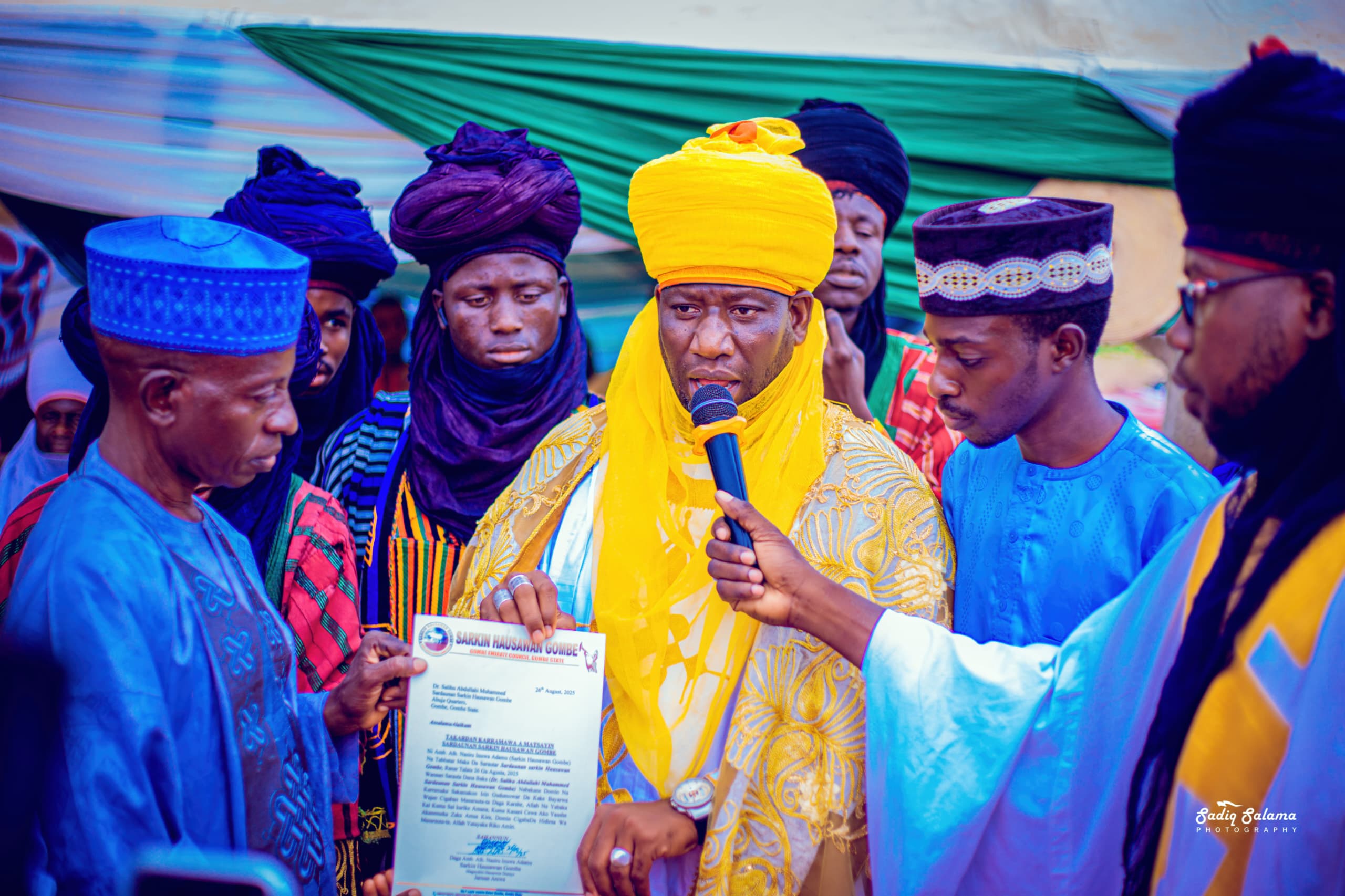
By Editor Daily Fact
The Sarkin Hausawa of Gombe, Alhaji Nasiru Inuwa Adamu, has called on residents of Gombe State to embrace unity, peace, and the promotion of cultural values that strengthen social harmony.
He made the call during the commemoration of World Hausa Day, celebrated every year on the 26th of August as set aside by the United Nations to honor the Hausa language, history, and cultural heritage.
Speaking at the event in Gombe, Alhaji Adamu expressed appreciation to the people of Gombe and the Emir of Gombe, Alhaji Dr. Abubakar Shehu Abubakar III, for providing an enabling environment where Hausa people and other communities can live peacefully and preserve their traditions.
The celebration featured a keynote lecture delivered by Dr. Muhammad Abdullahi (Jarman Kumo), who spoke extensively on the historical antecedents of the Hausa people, their cuisine, educational values, and way of life. He emphasized the need to preserve the Hausa identity in the face of modern challenges.
The event also included cultural displays, paper presentations, and a grand Hawan Durbar in the evening, which attracted a large crowd of residents, traditional leaders, academics, and cultural enthusiasts who came to witness the rich heritage of the Hausa people.
Prominent personalities from across the state graced the occasion, lending their voices to the importance of cultural preservation as a tool for unity, peacebuilding, and social development.
The Sarkin Hausawa reiterated that World Hausa Day should serve as a reminder for younger generations to embrace their heritage, language, and values while contributing positively to the peace and progress of Gombe State and Nigeria at large.
-

 Leadership1 year ago
Leadership1 year agoBreaking: African Union Appoints Pantami as Co-Chair of the 4th Industrial Revolution Policy Council
-
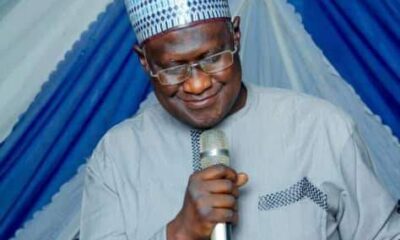
 Appointment1 year ago
Appointment1 year agoGombe State Indigene, Appointed New Vice Chancellor (ATBU)
-

 Politics2 years ago
Politics2 years agoFormer Gombe State APC Promoters Forum Chairman Attacked Following Political Commentary
-
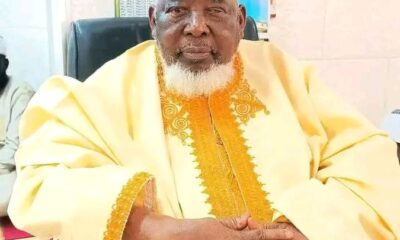
 Death8 months ago
Death8 months agoProminent Nigerian Islamic Scholar, Sheikh Sa’idu Hassan Jingir, Passes Away
-
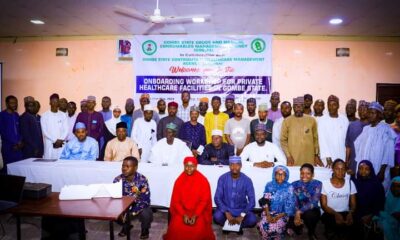
 Health1 year ago
Health1 year agoGombe State Organizes Onboarding Workshop for Private Healthcare Facilities
-
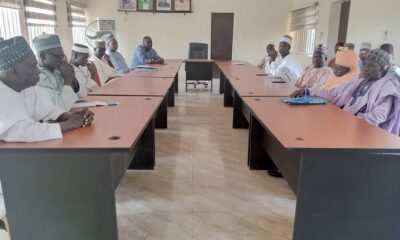
 Water2 years ago
Water2 years agoGombe Government Mobilizes Stakeholders to Combat Illegal Water Connections
-
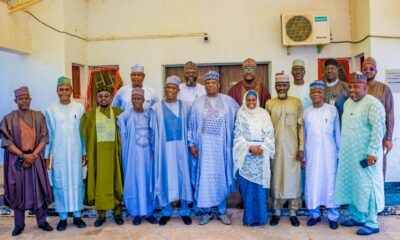
 Politics1 year ago
Politics1 year agoGombe State Inaugurates Human Capital Development Council
-
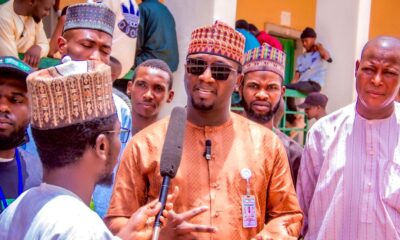
 Politics2 years ago
Politics2 years agoGombe State Launches Presidential Palliative Program (PPP) to Aid Small Businesses
